Ioannis Melissanidis: From the Olympic Podium to the Top of the Hill
by Cindy Klimek

Ioannis Melissanidis
The story of Sisyphus, a cursed Greek king forced to repeatedly push a boulder up a steep hill only to have it roll back to the bottom, has often been referred to as a metaphor for life. We all have obstacles and goals that we strive for. Luckily we aren’t forced to go after the same goals ad nauseam like Sisyphus, but the message is the same: never stop pushing. For some driven individuals like Ioannis Melissanidis, an Olympic gymnastics champion turned actor (who played Sisyphus himself in a recent production), the top of the hill isn’t the limit, but rather the sky beyond.
Melissanidis was born in Munich in March of 1977 to Greek parents working in Germany. The family returned to Greece when Melissanidis was a toddler, settling down in Thessaloniki. For the next few years he would have a fairly standard childhood. However, all that would change as a nearly nine year old Melissanidis decided he wanted to take gymnastics, despite his parents’ initial lack of support.
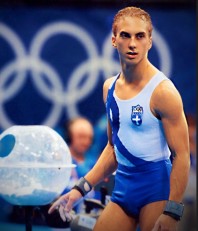
Ioannis Melissanidis
“My parents were more into education,” he says. “They were more into studies and musical instruments and foreign languages. You know, concentrating more on education and then doing sports for fun. But I loved gymnastics. This sport is the perfect combination of a high form of power and artistry. That’s why the official name for my sport internationally is artistic gymnastics. The motivation for me was that I wanted to fly. In gymnastics the athletes fly and that was really impressive to a little child. You can fly with your own power and fly with grace. If you see an eagle fly, he has this power and this strength and this poetry in his movement – that’s gymnastics.” To get the point across that he was serious, the precocious Melissanidis began a hunger strike. Two days later, his mother agreed to enroll him in gymnastics at the Spartakos Thessaloniki Club. “She thought I’d do it for a few days or a week and then be bored and want to try another sport but it didn’t work out like that,” he adds with a laugh.
However, young Melissanidis had to push a bit harder before he could begin learning gymnastics. When his mother first approached coach Athanasios Kapnidis, she was told that the class was full. “I spoke up, without any permission from my mother, and told him ‘you’re going to lose if you don’t take me,’” Melissanidis says with a laugh. “He just looked at me shocked. I told him, ‘that’s the wrong choice, mister! If you don’t take me in your class you’re going to lose and you’re going to regret it.’ So, the day after that I went back to take some tests and he decided right away to upgrade me to the competitive team. And boom, that’s how we started working together.” Kapnidis, who Melissanidis describes as “my mentor, my Socrates, everything to me”, would end up taking the young athlete all the way from his gym in Thessaloniki to the Olympic podium, leaving a trail of medals and broken records in their wake.
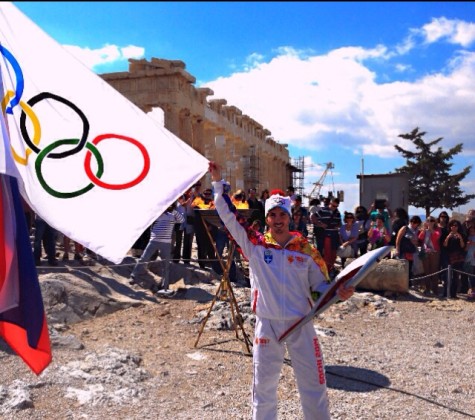
Carrying the Olympic Flame at the Athens 2004 Olympics
A few short years later, when Melissanidis was 11, he won the gold in a national completion and was interviewed along with the silver and bronze medalists. Says Melissanidis, “The interviewer asked us who our role models are and what our next goal is. The silver and bronze medalists said Russian athletes or Chinese athletes and that their next goal is another competition. When it was my turn, I said, ‘Well, I have a lot of respect for all athletes but I don’t have a role model that I want to copy. I respect them all, I can learn from them all, but my role model is myself. And my next goal is to win a gold medal at the Olympics.’ You can see the hunger I had even as a young child. Olympic gymnastics was my dream, my passion, and my goal.”

At the 2015 Special Olympics (Los Angeles)
After this win, things picked up for Melissanidis. He earned a bronze for his floor exercise at the Junior European Championships in 1991. Two years later, at the same competition, he turned the same event’s medal into gold and also brought home a bronze for the vault. In 1994, his floor exercise won him the gold at the European Championships and silver at the World Championships. With these new pieces of hardware, Melissanidis became the first Greek gymnast, male or female, to medal at the European and World Championships ever.
Melissanidis found out that he’d be going to the 1996 Olympics in Atlanta after making it through what he calls the competition of his life at the qualifying events in Tokyo. “In gymnastics, we only have one chance to qualify. You’re an athlete, but you’re also a human being so you might not be in the right state psychologically or mentally or physically, but thank God I was fortunate enough to make it through the competition of my life and I qualified. That’s the beauty of this sport as well, you have this pressure of representing your country and also the pressure of being a human being, of being a child, really. You have to behave not only as an adult but as a soldier. You have to be a Spartan. That’s why I highly recommend gymnastics to new athletes, it’s the foundation of most other sports. You learn from a very young age to respect your coach, to respect your elders, to respect your teammates, and you learn to be a soldier and compete. You become a soldier with values, a fighter who represents their country with Olympic values, and that is beautiful.”
Though an underdog going into the Games, Melissanidis would become the gold medalist for the floor exercise, earning Greece its first Olympic gymnastics medal since 1896, and its first floor medal ever. He would also become the youngest Olympic champion in the history of men’s gymnastics, a record that stands to this day.
However, despite Greece’s losing streak and the records to be broken, Melissanidis says he didn’t feel any extra pressure going into the competition. “I’m going to use a metaphor that might be a bit weird but it’s like a shark and blood. When you drop blood into the ocean, even if it’s miles away the shark will come. My character when I’m competing, my character when I have a goal and a target is like the shark. The medal was the blood. I couldn’t help myself. There was a mission I had to accomplish. I trained for years and nobody was going to take it away from me.”
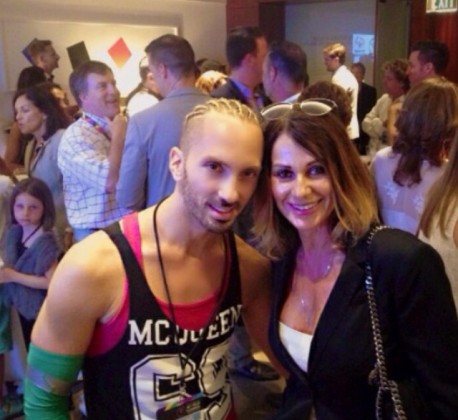
With all times gymnast Nadia Comaneci
Looking back 20 years later, Melissanidis says what he feels most now is pride. “I’m really proud of my coach and my parents and myself and the people that helped me,” he says. “Gymnastics is an individual sport but there’s a team behind you. I’m the one that has to deliver the story and execute the performance, but there is an ensemble of people that work and sacrifice and I’m really thankful for them. I’m so proud of these records because Greece was not on the world map of this sport. China or Russia or Romania or Japan were, leading the competition and the beauty of my medals is not only that we made a record. We became a part of sports history. My country’s name is up there along with mine and that is really, really beautiful. I showed a new generation of athletes that nothing is impossible as long as you want it even more than God. You have to want it so much that you can convince even God that He’s wrong and you’re right,” he adds with a laugh.
Melissanidis’s contribution to sports history is immortalized in the International Olympic Museum in Lausanne, Switzerland. The young athlete donated a t-shirt he wore during the Olympics with his autograph and “I love Macedonia” written on it. “My t-shirt is next to memorabilia from legendary athletes like Carl Lewis, Michael Jordan, Michael Johnson, so this is a great honor for me and a great honor for Greece,” he says.
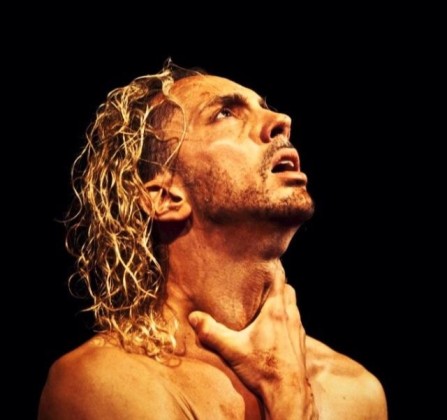
As Sisyphus in Samuel Beckett’s ‘Act Without Words I and II’, in London
To an outside observer, Melissanidis’s leap from gymnastics to acting may seem like a sudden one, but the man himself would disagree. “Theater was always one of my passions. From a very young age I can remember going to the theater. Even during my competitions, athletes listen to music that they like to get ready and encourage themselves. I had a CD of great actors and actresses like Manos Katrakis or Irene Papas doing their monologues. Can you imagine a 17 or 18 year old child going to compete at the World Championships or the Olympics listening to a monologue from Euripides or Medea or Oedipus Rex? That’s very uncommon,” he laughs. “But that’s me. That was my motivation that would empower me to go do my best at competitions. Theater wasn’t just all of a sudden because I didn’t have anything else to do. Thank God I had a lot of options and a variety of choices but theater was something that I really liked.”
Much like when he first decided to pursue gymnastics, Melissanidis enrolled in classes to learn the fundamentals of acting and get himself up to competition level. He studied at the Royal Academy of Dramatic Arts (RADA) in London and the American Academy of Dramatic Arts (AADA) in Los Angeles with scholarships from the Onassis Foundation.
“Greece is the birthplace of theater. I’ve seen hundreds of plays. That in itself is a great school for me because we have such amazing Greek actors and actresses. At the Royal Academy they’re a bit like us Greeks. They’re very focused on the classics, they have great playwrights like Shakespeare, and the British love theater. It’s part of their classic culture. In Los Angeles, at the American Academy, I was lucky to have very good teachers. They had a different format for approaching acting because in LA they’re more into contemporary works and also more into television and film, rather than theater. So, it’s really nice to get the triple influence of Greece, London, and Los Angeles,” he says, adding, “I’m flirting with theater right now. I don’t consider myself a great actor just because I studied at one school or another. A good doctor is not just a graduate of a good medical school. A good pilot is not just a graduate from a good flight school.”
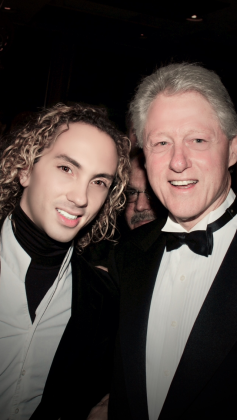
With former US President Bill Clinton
Melissanidis performed in a number of plays while in school, including playing Romeo in a RADA production of ‘Romeo and Juliet’, a role he describes as his favorite so far. He has also tread the boards in Athens, Rome, Berlin, Paris, and Bangkok, to name a few. And, he now counts famous Greek actresses like Olympia Dukakis and Irene Papas as friends as well as mentors. “They are the women of my life. I have learned and I keep learning from these ladies, and not only artistically speaking,” he says.
Melissanidis’s current labor of love, ‘Sisyphus,’ debuted in London before moving to Los Angeles. Based on Samuel Beckett’s ‘Act Without Words I and II’, the play is literally performed entirely without words. When asked what it’s like to be the star of a wordless, one-man play, Melissanidis exclaims with a laugh, “It’s exhausting!” He adds, “It’s a very challenging role because, for an actor, with words you can deliver the story. You have your tools. But when you don’t have words and you have to deliver a very dark, dramatic story like ‘Sisyphus’ you have to overexaggerate your pain or your comedic element or whatever. It’s really exhausting for the artist and not easy to digest for the audience.”
Despite Melissanidis’s claim, audiences have been digesting the play just fine. He has received rave reviews and been called “a passionate unique talent with Greek classical beauty” by Oscar-winning director Franco Zeffirelli. Furthermore, Melissanidis says he was able to see a “powerful connection” to the audience through the Q&A sessions he held after his Los Angeles performances. “The questions I was getting from the audience made me feel like I brought them onstage with my performance. We had a powerful connection. It was like they were breathing what I was breathing and they would stop breathing when I was not breathing. It was really, really touching and powerful to get that reaction from the audience.” Melissanidis says he hopes to bring the play to New York next and then, ideally, back home to Greece.
In the spirit of Sisyphus’s fight against suffering and obstacles, Melissanidis, a Special Olympics ambassador, donated a portion of the proceeds from his LA performances to the organization, and even invited some Special Olympic athletes to come see the play. “Those athletes are extraordinary athletes. I consider myself an ordinary athlete but those athletes are extraordinary. I wanted to bridge the two countries of the United States and Greece culturally and athletically. I wanted to do something to promote the Olympic spirit and my country, Greece. In this story of Sisyphus there are many parallels with those extraordinary athletes. Those athletes are facing their destiny and their lives every day with an unstoppable effort and an internal effort. It’s not easy. In this way I wanted to bridge the two countries. The US was hosting the Special Olympics (in Los Angeles). I am Greek, I am an Olympian, I am an artist, so that’s something I can give to these Special Olympic Athletes. They have this purity of love and innocence. It was my honor to do something for them,” he says.
Aside from Special Olympians, Melissanidis says Sisyphus can also be a metaphor for Greece’s twin crises of the economy and the influx of refugees. “We have to have an optimistic approach, especially the young people. The economy is a cycle. What is good today might not be good tomorrow and what is not good today may be good tomorrow. We have to be optimistic and fight for our dreams. The biggest problem we have now is the refugee crisis. These poor, beautiful people are leaving their countries not because they want to conquer our countries or because they’re bad people, they are leaving to survive and hope for a better future. However, Greece can’t receive them all, even the big countries can’t. Europe needs to take responsibility and share responsibility equally,” he says.
From a boy who wanted to fly to a young man who learned how, Melissanidis spent much of his life as a rising star. Today, as a grown man who has drawn raves acting with or without words, the sky remains the limit, just don’t ask him to look too far ahead. “I don’t know what’s going to happen after five years or 10 years. I take life every single day and I try to squeeze every single second out of it. The future is beautiful, it’s nice to make plans, but I’m more interested in the power of life now. Let’s stick to the beauty and color and life of the present,” he laughs.

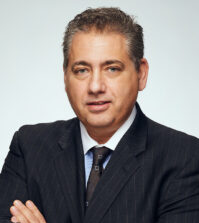
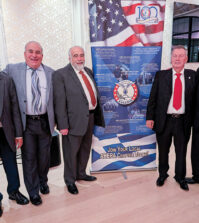
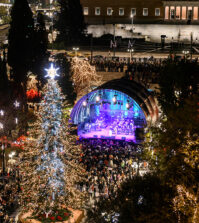











0 comments